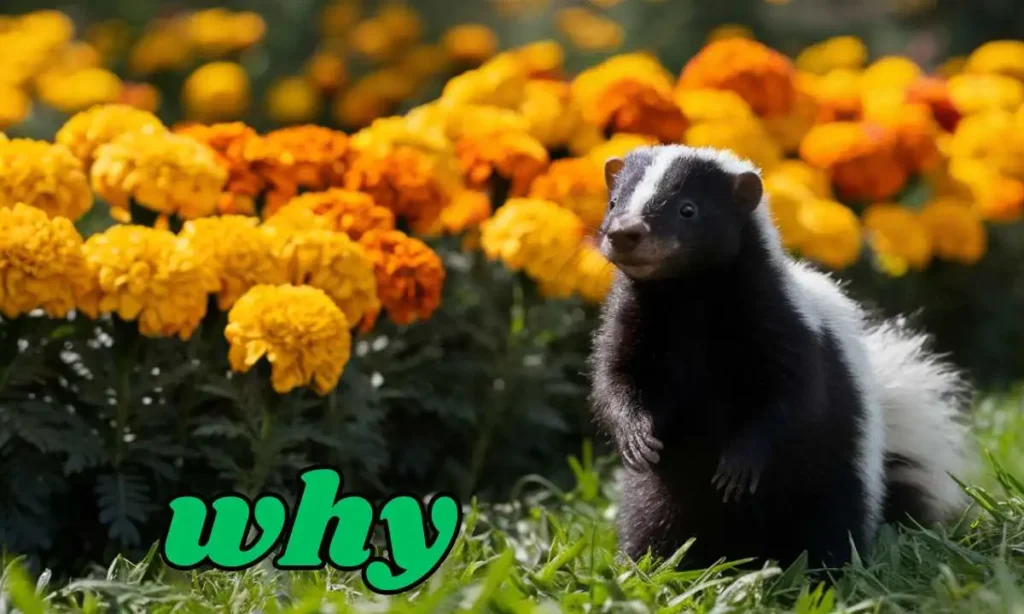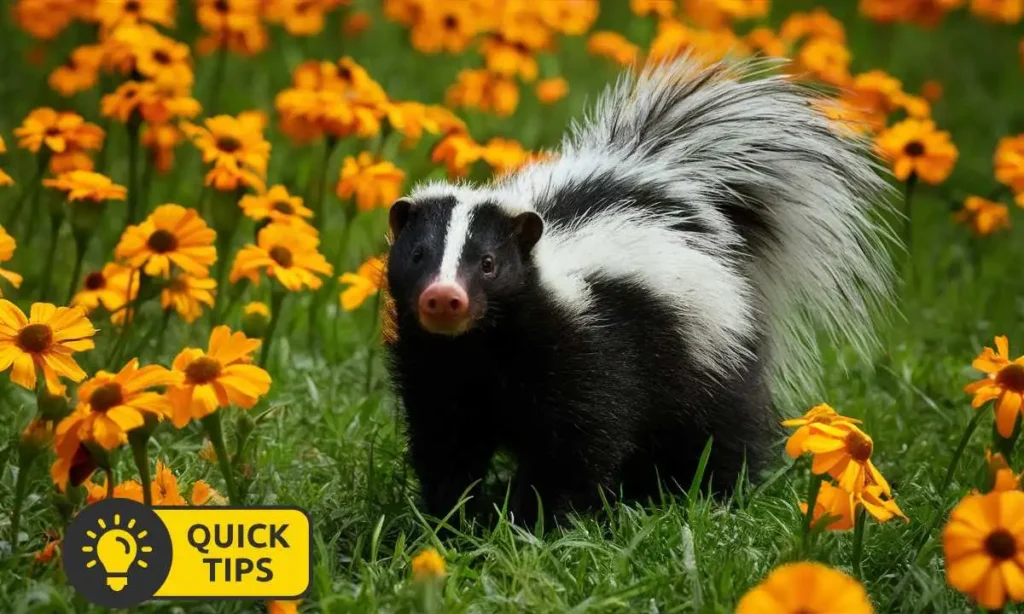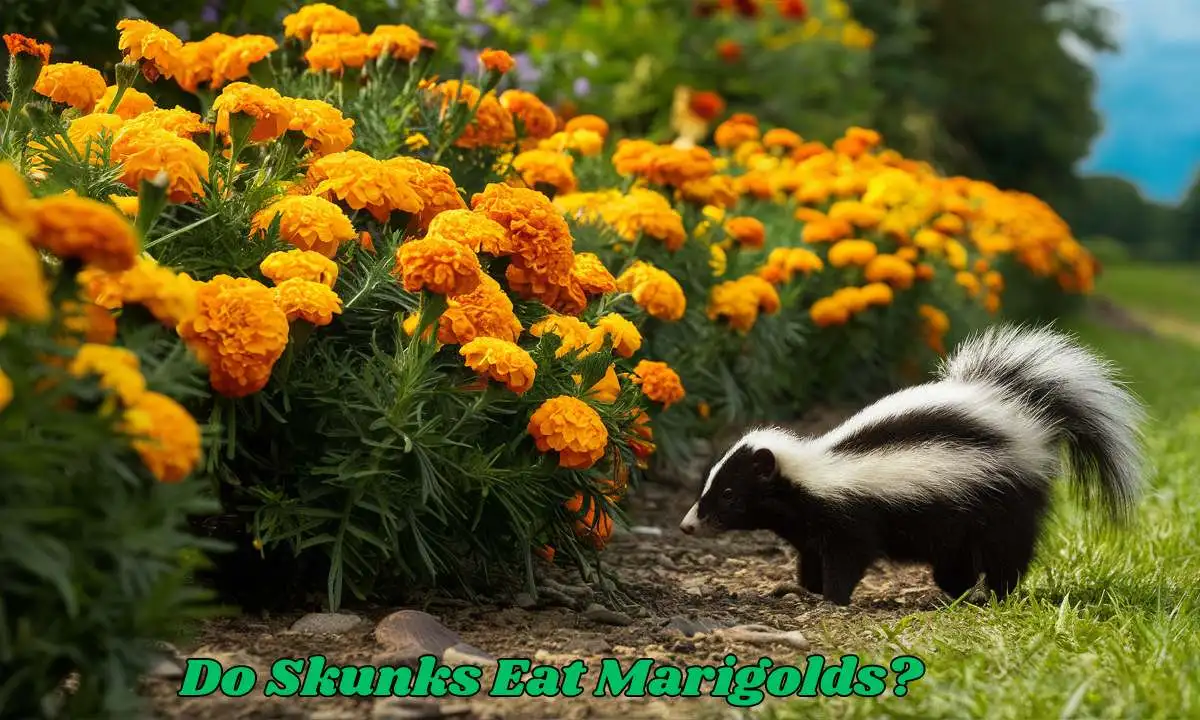Can Skunks Eat Marigolds? Safe Your Garden
Last updated on August 11th, 2024 at 07:30 am
Not really! As someone who owns a skunk and studies wildlife, I’ve discovered that skunks stay away from marigolds because of their strong odor. Marigolds could be the perfect plant if you want to keep your garden safe. Dive into this article to see how these flowers can keep skunks at bay.
Do Skunks Eat Marigolds?
Many gardeners ask, Do skunks eat marigolds? This question arises as marigolds are famous for their vibrant colors and pungent smell. These characteristics are often thought to deter pests. Skunks, known for their digging habits, can cause gardeners concern. Understanding skunks’ dietary preferences is crucial for protecting plants.
Anecdotal Evidence
Garden stories often highlight skunks’ eating habits. While some gardeners claim their marigolds remain untouched, others share different experiences. Here are a few observations:
- Skunks may dig in gardens not for plants, but for insects or grubs.
- Marigolds’ strong scent might not always repel skunks.
- Some gardeners notice bite marks on marigolds, suggesting skunks or other animals may sample them.
It’s essential to note that these accounts vary and do not provide a definitive answer. The following table summarizes gardeners’ observations:
| Gardener’s Claim | Marigolds Status | Possible Reason |
|---|---|---|
| Marigolds untouched | Intact | Skunks deterred by scent or not interested |
| Bite marks found | Damaged | Skunks or other pests sampling plants |
| Digging near marigolds | Intact or disturbed soil | Skunks searching for insects, not eating plants |
Scientific Studies
Research provides insight into skunks’ dietary patterns. Studies show that skunks are omnivores, eating both plant and animal matter. Their diet includes:
- Insects and grubs
- Small rodents
- Fruits and berries
- Occasionally, garden plants
However, specific studies on skunks eating marigolds are scarce. Scientists generally agree that skunks might not target marigolds due to their strong smell. Yet, hunger or a lack of food might drive them to eat what’s available. The points below summarize findings from scientific studies:
- Skunks prefer insects over plants.
- Marigolds’ scent might act as a mild deterrent.
- In dire situations, skunks might eat marigolds or other plants.
It’s important for gardeners to consider these findings. They help understand why a skunk might venture into a marigold patch. More research could provide clearer answers.
Why Skunks May Not Like Marigolds

Skunks usually eat plants and insects. But, do they eat marigolds? Not really. Let’s explore why skunks may not like marigolds. Their smell and taste, along with toxicity, play big roles.
Smell And Taste
Marigolds have a strong smell that skunks dislike. This smell comes from oils in the plant’s leaves and flowers. It’s nature’s way of protecting the plant. Here’s how the smell and taste affect skunks:
- Repellent scent: The scent of marigolds acts as a natural barrier. Skunks find it unpleasant.
- Bitter taste: If a skunk tries to eat a marigold, it finds a bitter taste. This discourages them from eating more.
Below is a table showing comparisons between marigolds and other plants skunks might eat:
| Plant | Scent Strength | Taste |
|---|---|---|
| Marigolds | Strong | Bitter |
| Tomatoes | Weak | Sweet |
| Corn | Weak | Sweet |
This shows why skunks prefer eating other plants over marigolds.
Toxicity
Marigolds contain compounds that can be toxic to skunks if eaten in large amounts. These compounds include:
- Pyrethrins: Natural insecticides that can harm skunks.
- Thiophenes: Another group of chemicals that can be toxic.
Here are some points on how toxicity affects skunks:
- Small amounts might not harm skunks, but large amounts are dangerous.
- Skunks have a natural instinct to avoid toxic plants, including marigolds.
This instinct helps them stay away from potential dangers in their environment. Thus, marigolds’ natural defense mechanisms protect them from being eaten by skunks.
Tips To Protect Your Marigolds From Skunks

If you’re a gardener who loves marigolds, you may be concerned about skunks causing damage to your beautiful flowers. Fear not, as there are effective ways to protect your marigolds from these pesky creatures. In this post, we’ll explore some tips to safeguard your marigolds from skunks.
Natural Repellents
Skunks are naturally repelled by certain scents and substances. Here are some natural repellents you can use to deter skunks from your marigolds:
- Garlic: Planting garlic around your marigolds can help repel skunks due to its strong odor.
- Pepper Spray: Spraying a mixture of water and hot pepper around your garden can deter skunks.
- Citrus Peels: Placing citrus peels near your marigolds can help keep skunks at bay.
Fencing
Installing a fence is a physical barrier that can effectively protect your marigolds from skunks. Here are some tips for fencing to keep skunks away:
- Digging Barrier: Bury the fence at least 12 inches underground to prevent skunks from burrowing underneath.
- Height: Ensure the fence is at least 3 feet tall to prevent skunks from climbing over.
- Mesh Size: Use a small mesh size to prevent skunks from squeezing through the openings.
Frequently Asked Questions
Several animals may be munching on your marigolds, including rabbits, deer, and slugs. To protect your flowers, consider using repellents or barriers.
Common culprits that may have dug up your marigolds include squirrels, rabbits, gophers, and deer. These animals often search for food or create burrows, disturbing garden plants in the process.
Marigolds repel rabbits, deer, and some insect pests with their pungent scent. These animals typically avoid areas where marigolds are planted.
Conclusion
Wrapping up, skunks may occasionally nibble on marigolds, but these flowers are not their preferred choice. To deter these critters, consider companion planting or natural repellents. Remember, a diverse garden is your best defense against unwanted visitors. Keep your blooms safe and your garden thriving!

